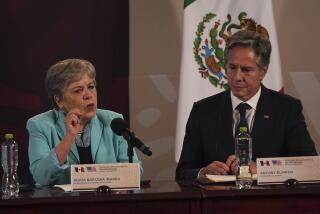Habib’s Talks in Manila: Sobering Messages, Little Compromise
- Share via
MANILA — When White House special envoy Philip C. Habib sat down with President Ferdinand E. Marcos in the wood-paneled private study of Malacanang Palace this week, both men were all smiles and cordiality.
And when Habib met later with opposition leader Corazon Aquino at her office in Manila’s financial district, she greeted him with a cheerful “What can I do for you, Mr. Habib?”
But as soon as the courtesies were over, both Marcos and Aquino reportedly delivered more sobering messages. At this point, neither one appears willing to yield to the other to strike a compromise in the Philippine political crisis.
Habib, who is scheduled to return to Washington today, has resolutely avoided making any substantive comment on his week of talks with Marcos, Aquino and other Philippine political figures.
A Basic Message
But interviews with several Filipinos who met with Habib, as well as with U.S. diplomats and congressional staff members in Manila, suggest that the veteran diplomat will take at least one basic message back to President Reagan: For now, the Aquino-Marcos conflict is a standoff between an irresistible force and an immovable object, and there doesn’t appear to be much room for the United States to negotiate a compromise.
Not until Marcos and Aquino test each other’s popular support--and each other’s nerve--will the conditions become ripe for negotiation, the diplomats predicted.
Marcos aides said the president told Habib that he considers himself the legal winner of the election, regardless of the still growing evidence that he “won” only through widespread and flagrant fraud.
Facing Two Choices
Labor Minister Blas F. Ople, Marcos’ campaign manager, said after meeting Habib that the choice before the Reagan Administration is between supporting “a legitimately elected president . . . and forces protesting in the streets after losing an election.”
On the opposition side, Aquino said she told Habib that she and her followers will refuse to recognize Marcos as president, because they believe she would have won the election if it had been conducted fairly. (U.S. intelligence analysts agree, a well-placed American source here said.)
“The crisis can only be resolved by a swift and orderly transfer to the Aquino presidency,” Aquino said after her first meeting with Habib.
Habib, speaking through a U.S. Embassy spokesman, denied reports published in the Washington Post that he actively pressed Marcos to share power with Aquino or risk losing American military and economic aid.
No Plan Offered
Filipinos who met with Habib also said that the U.S. envoy presented no specific plan for resolving the crisis. “Habib made no demands,” Teodoro Locsin Jr., a top Aquino adviser, said. “He spent most of the time listening. He appeared to take her thesis very seriously--that she has won and is not going to give up now.”
Habib’s mission was never designed to produce an immediate solution to the crisis.
Officials in Washington said that Reagan dispatched Habib in part to find out what kind of outcome is both desirable and possible to achieve. He was also sent in part to try to slow developments found in Manila to give the Administration a chance to act, one U.S. source said.
Aquino aides said Habib pressed the opposition leader to spell out a timetable for her protest campaign against Marcos.
One key Aquino adviser, mining executive Jaime Ongpin, said that she envisages a campaign of “two to three months . . . to shake the foundation and structures which prop up the regime.”
Finally, Habib was charged with explaining to Marcos and Aquino the meaning of Reagan’s varying statements on the Philippines, which veered from an implied endorsement of the election results last week to a clear condemnation over the weekend of the vote fraud committed by the Marcos regime.
Success Indicated
Habib appears to have succeeded in that task, at least on the opposition side. Initially, Aquino warned that she might refuse to meet with the U.S. envoy if he intended to negotiate a compromise on the basis of Reagan’s suggestion that she work with the reelected Marcos government. But after meeting with Habib, she dropped virtually all criticism of the Administration from her speeches and public statements.
Marcos and his lieutenants, on the other hand, have grown increasingly worried that Reagan may withdraw his support for their regime--an idea they have denounced as “intervention” in the Philippines’ internal affairs.
More to Read
Sign up for Essential California
The most important California stories and recommendations in your inbox every morning.
You may occasionally receive promotional content from the Los Angeles Times.













